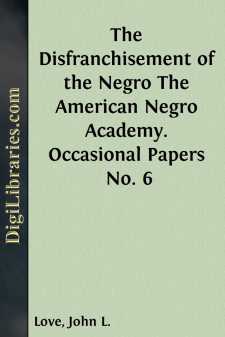Categories
- Antiques & Collectibles 13
- Architecture 36
- Art 48
- Bibles 22
- Biography & Autobiography 813
- Body, Mind & Spirit 142
- Business & Economics 28
- Children's Books 17
- Children's Fiction 14
- Computers 4
- Cooking 94
- Crafts & Hobbies 4
- Drama 346
- Education 46
- Family & Relationships 57
- Fiction 11829
- Games 19
- Gardening 17
- Health & Fitness 34
- History 1377
- House & Home 1
- Humor 147
- Juvenile Fiction 1873
- Juvenile Nonfiction 202
- Language Arts & Disciplines 88
- Law 16
- Literary Collections 686
- Literary Criticism 179
- Mathematics 13
- Medical 41
- Music 40
- Nature 179
- Non-Classifiable 1768
- Performing Arts 7
- Periodicals 1453
- Philosophy 64
- Photography 2
- Poetry 896
- Political Science 203
- Psychology 42
- Reference 154
- Religion 513
- Science 126
- Self-Help 84
- Social Science 81
- Sports & Recreation 34
- Study Aids 3
- Technology & Engineering 59
- Transportation 23
- Travel 463
- True Crime 29
The Disfranchisement of the Negro The American Negro Academy. Occasional Papers No. 6
by: John L. Love
Description:
Excerpt
“A Constitution formed so as to enable a party to overrule its very government, and to overpower the people too, answers the purpose neither of government nor of freedom”—Edmund Burke.
The assault, under the forms of law, which is being made upon the political rights of the Negro is the symptom of an animus which has its roots imbedded in the past. It does not mark a revival, but rather the supreme desperate effort of the spirit of tyranny to compass the political subjection and consequent social degradation of the black man. Its provocation does not consist in any abnormal or perilous condition in southern communities arising from a numerical preponderance of Negroes. It is not made to meet a merely temporary emergency with the intent to return to the principles of republican government upon the advent of intelligence and wealth to the Negro. Indeed, the very intent and purpose of the assault is to prevent such an advent, in so far as human ingenuity and tyrannical violence can do so.
It can not find its justification in a necessity of averting by radical measures any imagined perils to social order which might arise from the political domination of ignorance; for the spirit which prompts the assault has ever fostered ignorance and endeavored to perpetuate it. In fact, the assault is so iniquitous in its conception and is being executed with such wicked and violent disregard of political morals and human rights, as by comparison to render almost beneficent the realization of the perils which the imagination of the assailants pretends to fancy.
There may be those who see in this assault nothing more than a supreme effort of a benign civilization to save itself from utter ruin. It is, however, to be borne in mind that the apostles of this civilization which is of a peculiarly local type, have ever asserted that its maintenance and future glory are inseparably connected with the subjection of the Negro. Always they have spoken the language of tyranny, which, in spite of its embellishments and jugglings, amounts to this: the social well-being and political privileges of the Negro are inconsistent with the economic interests and political ambitions of a few southern white men. Into this language all of the feigned social perils and political nightmares of southern planters and politicians easily resolve themselves.
There may be those who indulge the hope that the final triumph of this assault will have a salutary effect upon the social status of the Negro. Their hope is due in no small measure to their ignorance of the history of the character, spirit, and dominant purpose of the assailants. That history furnishes the best key to an understanding of the present assault upon the political rights of the Negro.
Forty years ago the slave power plunged this nation into war for the avowed purpose of perpetuating Negro slavery. Alexander Stevens, on his return from the convention which had erected the Southern Confederacy, addressing a large assembly at Savannah, uttered the following significant words:
“The new Constitution has put at rest forever all the agitating questions relating to our peculiar institution—African slavery as it exists among us—the proper status of the Negro in our form of civilization....


